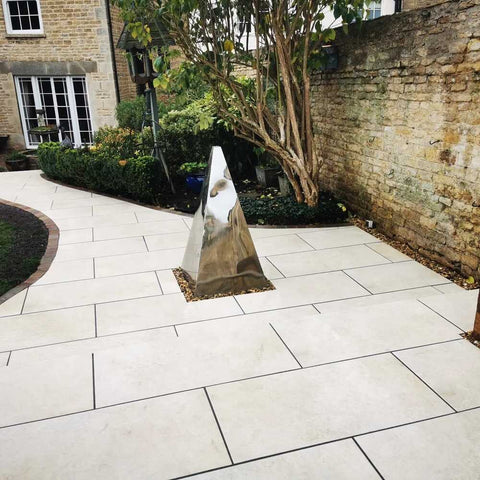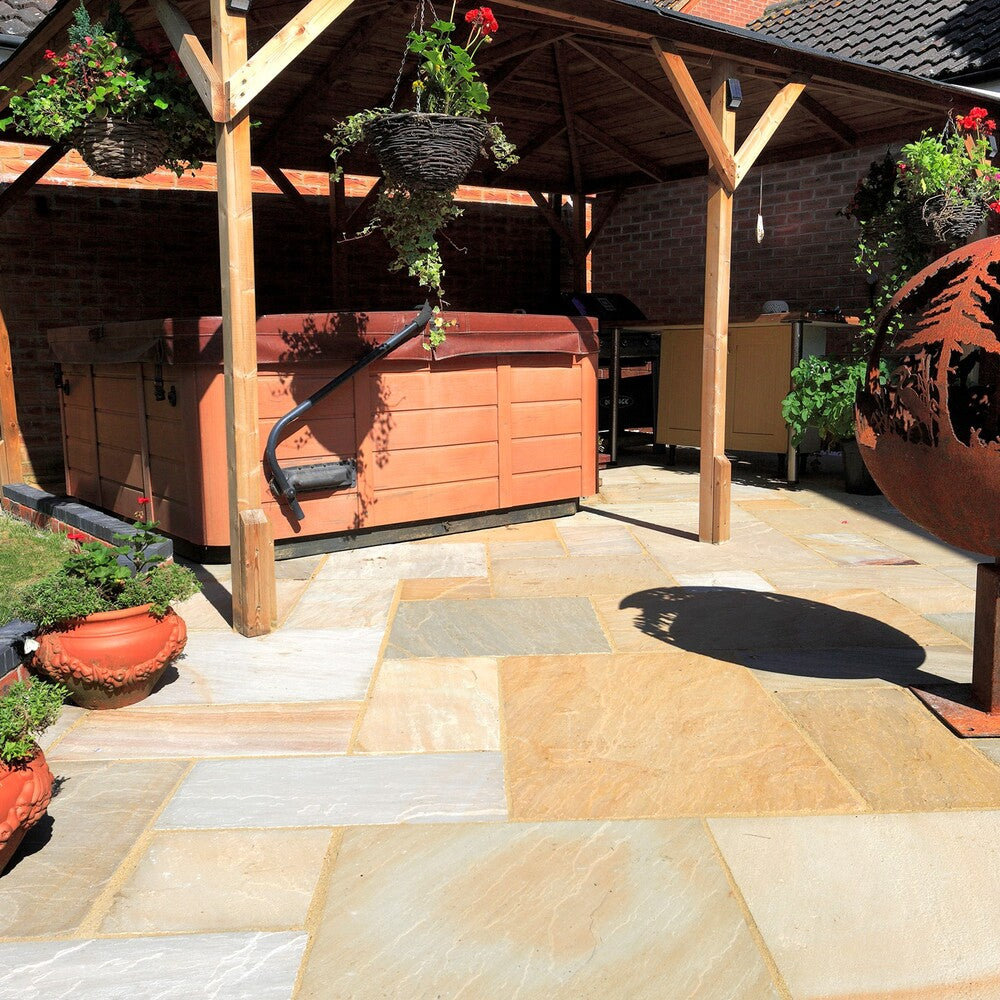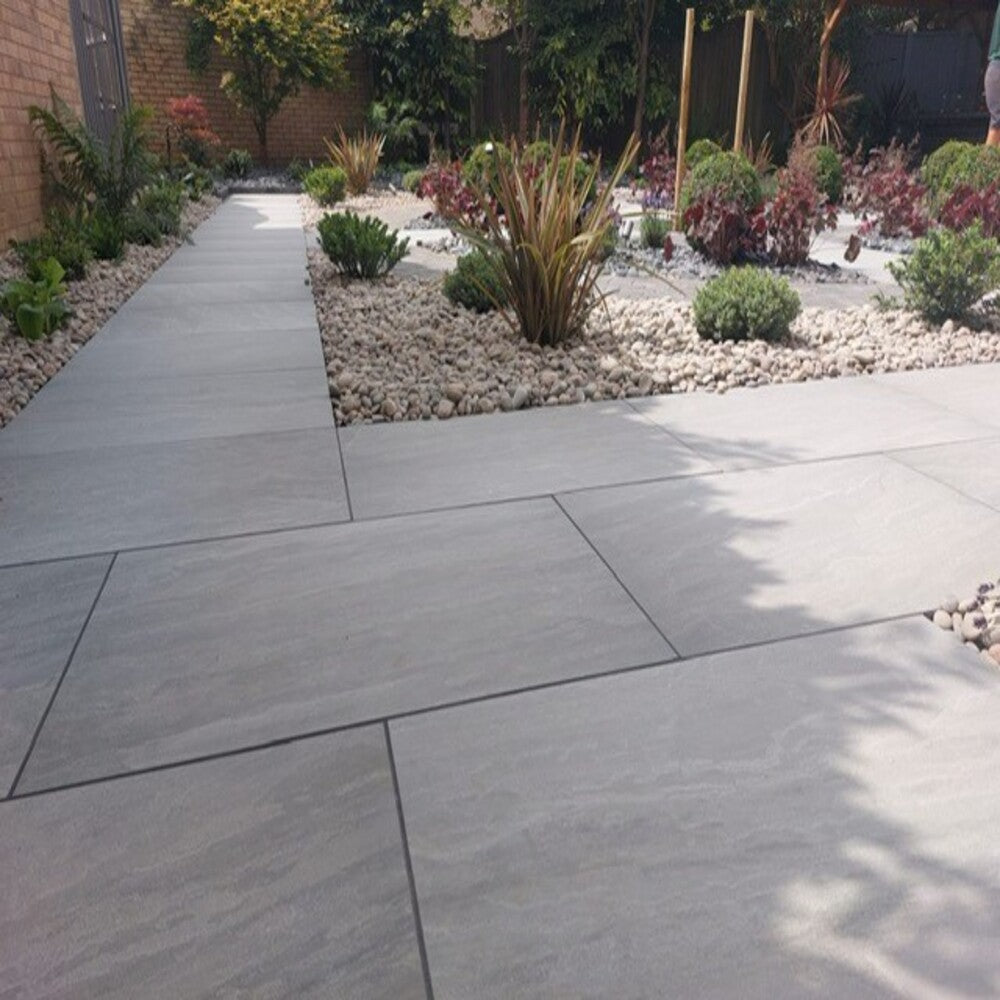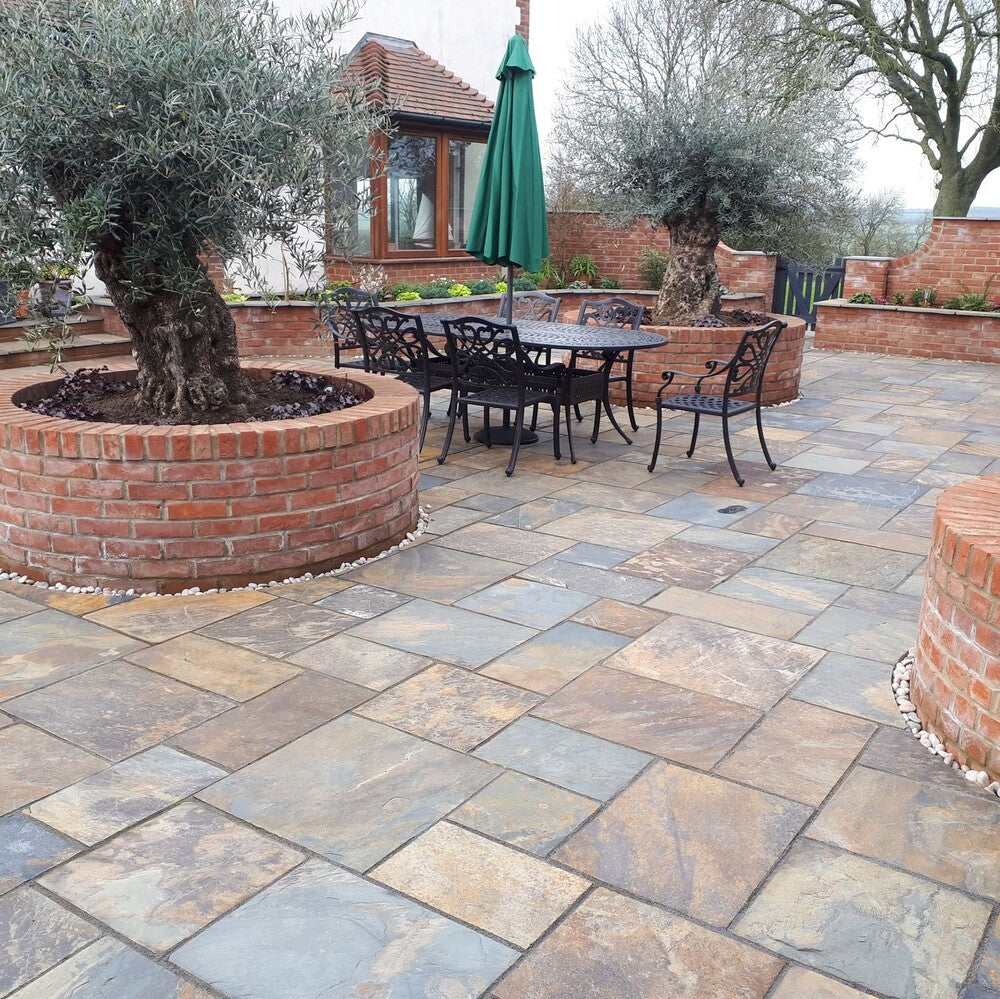If you want a family-friendly space outdoors, you really should consider non-slip paving stones. These paving slabs offer great anti-slip characteristics and are great for shaded areas where they can be a build-up of moss and algae too.
By choosing coarse paving slabs, textured paving stones and riven paving you can have more grip underfoot. This will help prevent the risk of slips, trips, falls and other common family accidents that can happen in the garden.
Non-slip paving slabs doesn’t mean that you can’t still have beauty across your paved area. Our non-slip porcelain paving has what's know as a "slip resistance" rating of R11 which is the recommended minimum standard for outdoor porcelain paving. It even retains grip underfoot when wet while offering a state of the art and stunning paving solution for your paved garden area.
What Types Of Non-Slip Paving Are There?
Riven Paving
Riven paving is a traditional hand-split paving slab. It is often made from slate or sandstone. Riven paving offers an attractive finish as the texture shows the colours and natural layers of the stone. The uneven surface of riven paving stones offers lots of charm and character, while providing a more non-slip surface than other paving stones.
While there is no special process that the slabs have undergone, they are naturally rough and textured from the quarrying process and provide plenty of grip underfoot.

Raj Green Indian Sandstone - Naturally Non-Slip
Coarse or Textured Paving
The great thing about coarse paving is that it is manufactured with a grippy and textured surface. This is why coarse paving is referred to as textured paving. They are a tough and robust type of paving slab made from crushed natural stone particles often including granite. Coarse paving makes a practical paving option for family homes and gardens.
R11 Non-Slip Paving (Vitrified Porcelain Paving)
If you’re looking for something modern and sophisticated in your garden, that is still safe for your family, then you may want to consider R11 non-slip paving slabs. They offer a smooth finish to your garden paving with great traction and grip underfoot, even when wet.

Masso Grey Porcelain - View Our Most Popular Porcelain
Are Large Paving Slabs More Slippery?
This is definitely not the case. The anti-slip rating standards of porcelain paving slabs are very high. They are high-performance outdoor paving slabs with a great level of slip resistance and a safe anti-skid surface. The anti-slip rating of porcelain tiles means that you can have any colours, finishes or styles that you want, with the added bonus of a practical and non-slip patio surface.
The size of the slab is irrelevant in this instance. With a material such as honed sandstone or even a granite paver, the smaller the stone, the more joints there are and therefore the more grip you will have. Larger granite or honed paving slabs can become very slippery very quickly.

Porcelain Tiles Offer Better Slip-Resistance Than Other Outdoor Paving
Porcelain is a non-porous material. This means that moisture will not penetrate the surface of the porcelain paving slab. This helps prevent any moss build-up and algae growth too. The growth of moss and algae can make surfaces more slippery, but as the porcelain stops the growth from being absorbed into the stone, the area is less slippery once this has been easily cleaned away.
If you have a patch of your garden that goes green quickly, it might be worth considering porcelain for this area to save yourself the headaches.
How Are Paving Slabs Rated For Slip Resistance?
Any outdoor tiles or paving slabs that are manufactured for domestic installation, must undergo specific tests to establish their slip resistance rating. For example, there is a DIN 51130 test. This is completed on an inclined ramp. The ramp is made wet. It is then gradually inclined to become steeper and steeper. The tester wears standardised shoes with a rubber sole to test the slip resistance of the paved floor.
The slabs that are tested are then given an anti-slip rating. R11 non-slip paving slabs are paving stones that offer increased friction. The R11 anti-slip rating standard means that the paving slab is ideal for external areas like patios, paths and similar.

Riva Cream Porcelain Paving - Shop Here
Do Sealants Make Paving More Slippery?
When sealants are first applied, they can affect the slip-resistance of a paving stone. However, this will wear off over time. If you are concerned about the slip resistance of your garden paving, then you can mix a polymer and polyethylene grit into the liquid sealant before it is applied. It can also be scattered onto the wet sealant, so it binds to the surface. To further increase the anti-slip rating standards, you could scatter a light coating of kiln-dried jointing sand to the surface. This will help roughen the surface and in turn, make it less slippery.
In general, we would not recommend this as a DIY project as the supplier will no longer be liable for failure of a sealant and we've barely heard of fresh sealant becoming an issue. Within a matter of weeks or even days, any slip factor that a solvent-based sealer may have produced will be all but gone as soon as the sealant has dried and soaked into the stone.
Why Choose Non-Slip Paving Stones? – Overview
There are many, many options when it comes to non-slip patio slabs, after all, they are specifically designed to be used outdoors in all weather, so it is imperative they are fit for purpose.
Peace of mind is priceless. So if you wanted to have a formal standards guarantee that your patio will be non-slip in all weathers, then porcelain paving may well be the one to go for. As we mentioned, it has gone through specific testing to make sure that it is suitable so comes with the knowledge it will be family-friendly for the old and young alike!
If you want to read more about the different types of porcelain paving that are available on the market, then we've written a more complete guide specifically about our porcelain ranges here.



